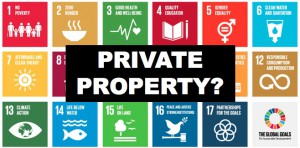“Global Goals” Awakens Privatization Concerns
 The NGO-sponsored initiative Global Policy Watch (GPW) has questioned the relationship between the UN’s Sustainable Development Goals and the “Global Goals,” as they have been rebranded by the UN-affiliated PR campaign called Project Everyone. They have raised concerns that the promotion of the Global Goals by a private organization, supported by many large corporations, could amount to a partial act of privatization of the SDGs themselves.
The NGO-sponsored initiative Global Policy Watch (GPW) has questioned the relationship between the UN’s Sustainable Development Goals and the “Global Goals,” as they have been rebranded by the UN-affiliated PR campaign called Project Everyone. They have raised concerns that the promotion of the Global Goals by a private organization, supported by many large corporations, could amount to a partial act of privatization of the SDGs themselves.
All the content of the GlobalGoals.org website — which is strongly promoting the SDGs — is clearly protected by copyright, including the icons that were projected onto the UN building during the SDG summit (see photo). GPW complains that this amounts to the privatization of a public good. The owner of the Global Goals website and resources, Project Everyone, is not an NGO or charity, but “a private company incorporated and registered in London.”
When accessing the GlobalGoals.org website (which 17Goals has also recommended), the user must first click to agree to an “Asset License” before visiting the Resources page, where the Global Goals icons and other free materials are made available. Global Policy Watch notes that in doing so, the user agrees that these materials — including the small summary labels for the goals themselves — are intellectual property that “belongs to or has been licensed by Us” (that is, Project Everyone).
GPW notes that the partners in Project Everyone include 60 large corporations, as well as over 20 well-known NGOs, including a number of UN agencies that Project Everyone “curiously lists as NGOs”.
GPW raises further concerns that some of the simplified goal statements now being promoted to all seven billion of the world’s citizens (which is the goal of Project Everyone) effectively change the meaning of the SDGs themselves, as agreed upon by the United Nations member states. “Sustainable production and consumption patterns” has become, on the GlobalGoals.org website, “Responsible consumption and production” — a very http://www.lbwr.org/ambien/ different concept that leaves out the notion of systemic limits (“sustainable”), as well as the fair distribution implied (in the word “patterns”).
GPW recognizes that anyone can use the SDGs themselves (which are a public good) and create their own interpretations. But it worries that the close relationship to the UN that Project Everyone enjoys can lead to confusion between which statements are the actual Sustainable Development Goals, and which are a simplified reinterpretation offered by Project Everyone for communications purposes.
“Do Member States know that they could be supporting a campaign that is not owned by the UN if they refer to the Global Goals instead of to the SDGs?” asks GPW, a partnership of NGOs whose funding comes from the International Labour Organization (ILO), the German Federal Ministry for Economic Cooperation and Development (BMZ), the Flemish North South Movement 11.11.11, and the Spanish Agency for International Development Cooperation (AECID).
Note: 17Goals is not taking sides in this debate but will continue to follow the story as it develops. We will also continue to encourage people to make use of the resources provided by GlobalGoals.org if they want to, while providing our own resources as well as links to other free resources provided by other organizations.
17Goals itself is a partnership that brings together for-profit and non-profit organizations, as well as individuals. See our Partners page. The images used on our website are either licensed from stock photography services or from open source (non-copyrighted) image banks.
17Goals uses the text from the actual SDGs and encourages people to get familiar with the details of the United Nations agreement in which they are embedded, “Transforming our World: The 2030 Agenda for Sustainable Development” (available there in six languages).
Goal 1/Goal 2/Goal 3/Goal 4/Goal 5/Goal 6/Goal 7/Goal 8/ Goal 9/Goal 10/Goal 11/Goal 12/Goal 13/Goal 14/Goal 15/Goal 16/Goal 17

No comments